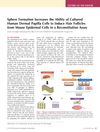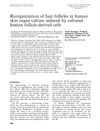Costunolide Promotes the Proliferation of Human Hair Follicle Dermal Papilla Cells and Induces Hair Growth in C57BL/6 Mice
May 2018
in “
Journal of Cosmetic Dermatology
”

TLDR Costunolide helps human hair cells grow and can stimulate hair growth in mice.
The 2018 study "Costunolide promotes the proliferation of human hair follicle dermal papilla cells and induces hair growth in C57BL/6 mice" found that Costunolide (COS), a naturally occurring sesquiterpene lactone, significantly promoted the proliferation of human hair follicle dermal papilla cells (hHFDPCs) and induced hair growth in C57BL/6 mice. COS was found to increase the expression of cell proliferation markers cyclin D1 and CDK4, while reducing the expression of p27, suggesting that COS might contribute to cell cycle progression and hHFDPC proliferation. COS also inhibited the 5α‐reductase activity in hHFDPCs, an enzyme involved in hair loss. Topical treatment of COS on shaved mice for 15 days promoted significant hair growth. The study concluded that COS treatment promotes dermal papilla proliferation and stimulates hair growth by activating Wnt/β-catenin and Shh signaling, and inhibiting TGF‐β/BMP/Smad signaling in hair follicular cells.










